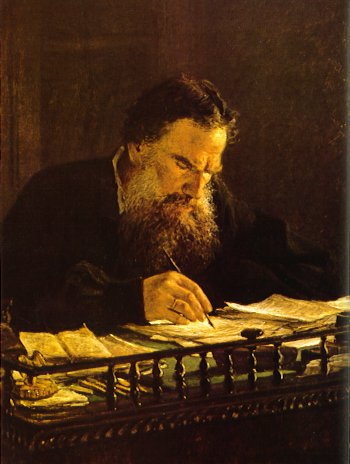The directory «Plots of stamps in the catalogue»
Tolstoy (Òîëñòîé) Lev Nikolaevich
(1828—1910)
«War and Peace»

The novel tells the story of five aristocratic families (particularly the Bezukhovs, the Bolkonskis, and the Rostovs--the members of which are portrayed against a vivid background of Russian social life during the war against Napoleon (1805-14).) and the entanglement of their personal lives with the history of 1805-1813, specifically Napoleon's invasion of Russia. As events proceed, Tolstoy systematically denies his subjects any significant free choice: the onward roll of history determines happiness and tragedy alike. In his 365 chapters (roughly 1500 pages), some only a few pages in length, Tolstoy tells of birth and death, balls and battles, gossip and tragedy, military strategy and political philosophy. While roughly the first two-thirds of the novel concern themselves strictly with the fictional characters, the later parts of the novel, as well as one of the work's two epilogues, increasingly contain highly controversial, nonfictional essays about the nature of war, political power, history, and historiography. Tolstoy interspersed these essays seamlessly into the story in a way which defies conventional fiction. Certain abridged versions removed these essays entirely, while others (published even during Tolstoy's life) simply moved these essays into an appendix. If there is a central character to War and Peace it is Pierre Bezukhov, the illegitimate son of a wealthy count, who upon receiving an unexpected inheritance is suddenly thrust upon with the responsibilities and conflicts of a Russian nobleman. His formerly carefree behavior vanishes and he enters upon a philosophical quest particular to Tolstoy: how should one live a moral life in an imperfect world? He attempts to free his peasants and improve his estate, but ultimately achieves nothing. He enters into marriage with Prince Kuragin's beautiful and immoral daughter Elena, against his own better judgement. Elena and her brother Anatoly then conspire together for Anatoly to seduce and dishonor the young and beautiful Natasha Rostova. Pierre rescues her, but recoils from his feeling of love for her. When Napoleon invades Russia, Pierre observes the Battle of Borodino up close by standing near a Russian artillery crew and he learns how bloody and horrific war really is. When Napoleon's Grand Army occupies an abandoned and burning Moscow, Pierre takes off on a quixotic mission to assassinate Napoleon and is captured as a prisoner of war. After witnessing French soldiers sacking Moscow and shooting Russian civilians, Pierre is forced to march with the Grand Army during its disastrous retreat from Moscow. He is later freed by a Russian raiding party. His wife Elena dies sometime during Napoleon's invasion and Pierre is reunited with Natasha while the victorious Russians rebuild Moscow. Pierre finds love at last and marries Natasha. Tolstoy vividly depicts the contrast between Napoleon and the Russian general Kutuzov, both in terms of personality and in the clash of armies. Napoleon chose wrongly, opting to march on to Moscow and occupy it for five fatal weeks, when he would have been better off destroying the Russian army in a decisive battle. General Kutuzov believes time to be his best ally, and refrains from engaging the French, who ultimately destroy themselves as they limp back toward the French border. They are all but destroyed by a final Cossack attack as they straggle back toward Paris.
Hungary, 1948, Lev Tolstoy, «War and Peace»
USSR, 1956, Lev Tolstoy, «War and Peace»
Vatican, 2010, Moscow's Burning
USSR, 1965,  Scene from film «War and Peace»
Scene from film «War and Peace»
USSR, 1966,  Scene from film «War and Peace»
Scene from film «War and Peace»